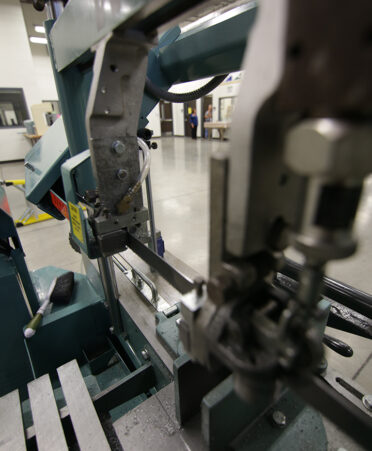Precision machinist students gain experience on relevant equipment
(ROSENBERG, Texas) – You may understand what goes into manufacturing a car or an airplane, but do you know how the machines to make those vehicles are manufactured themselves?
That is the role of a precision machinist.
“We make all the mechanics to put your vehicles together,” said Deogratias Nizigiyimana, lead instructor for the Precision Machining Technology program at Texas State Technical College’s campus in Fort Bend County.
“When people learn about the program for the first time, I explain exactly what we do because it’s not easy to see how machinists are contributors of a community,” he said.
TSTC offers an Associate of Applied Science degree in Precision Machining Technology, a Machining certificate of completion and a Basic Machining occupational skills award.
Students who enter this program receive hands-on training on equipment used in the careers they will pursue following graduation.
It is an important distinction from other schools, Nizigiyimana said.
“Here, because we use the same equipment they’re going to use once they finish, we train the student — we don’t prepare the student for training,” he said. “Other technical schools, those instructors show students how — the instructor operates the machine and students watch the instructor. Here, we have the students operate the machine to have hands-on experience. That’s what makes TSTC different from other technical colleges.”
Nizigiyimana has worked as a precision machinist since 2004 at companies like National Oil, General Electric and more. His relevant experience is an added benefit for his students.
“I know exactly what students need to learn for precision machining,” he said.
Those skills are in high demand in industry.
Computer numerically controlled (CNC) tool programmers can earn an average annual salary of $57,670 in Texas, according to the U.S. Bureau of Labor Statistics. Onetonline.org forecasts 29% growth for such positions over the next seven years in the state.
The Precision Machining Technology program is part of TSTC’s Money-Back Guarantee initiative — a testament to how much demand there is for such positions in the workforce. Precision machinist students who graduate from TSTC and do not find a job in their field in six months will receive a refund of their tuition.
Nizigiyimana finds that students attending TSTC in order to make a career change, obtain training and earn a degree have the most success in his program — especially nontraditional students who may be switching careers.
“Those coming back because they want to have improvement in their life, they’re focused and they do good work,” he said.
Learn more about TSTC at tstc.edu.
